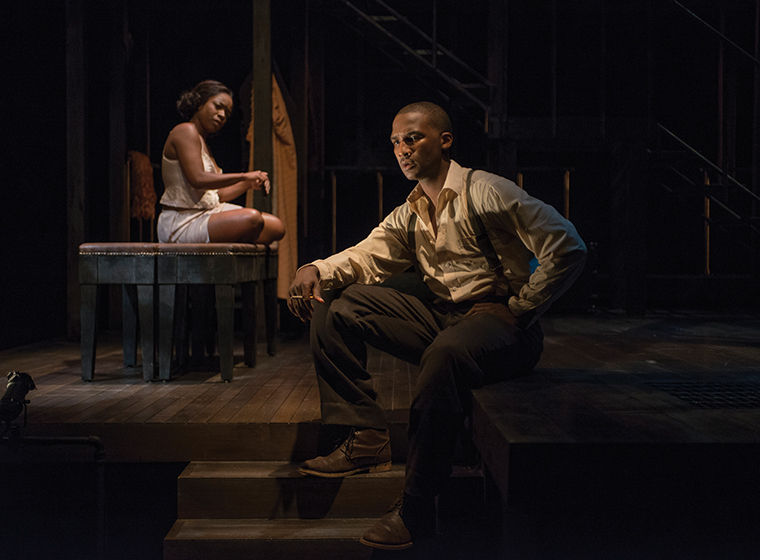Richard Wright’s ‘Native Son’ returns home, disturbs audiences
Native Son at the Court Theatre
October 6, 2014
Richard Wright’s classic novel “Native Son” proved to be controversial when it was first published in 1940, and that controversy remains in Nambi E. Kelley’s stage adaptation of the novel, which will run through Oct. 19 at Hyde Park’s Court Theatre, 5535 S. Ellis Ave.
“Native Son” tells the story of Bigger Thomas, a poor 20-year-old black man living on Chicago’s South Side in the 1930s. Wright’s novel tells the story of how Thomas has to survive in an already prejudiced world after accidentally killing the daughter of the rich white Dalton family—a family who employs him as a driver. Kelley’s adaptation is directed by Seret Scott and deals mostly with the first two parts of the novel. Kelley said she decided to adapt the novel because she has loved Wright’s work for many years.
“I didn’t choose ‘Native Son.’ ‘Native Son’ chose me,” Kelley said in an email. “I stumbled upon a copy of it on my mother’s shelf when I was 8 years old. Although I did not finish the book at that time—my mother caught me and snatched it away—years later, it would become my favorite novel.”
Wright’s novel has become a seminal piece of African-American literature, according to Ann Rayson, an associate professor of African-American literature at the University of Hawaii. “Native Son” was not the first novel to deal with the racial divide in the U.S., but it was the first widely-read commercial success, Rayson said.
“It is the first No. 1 bestseller by an African-American writer,” Rayson said. “It’s incendiary as well, and the Book of the Month Club took it as a selection but he had to take out a few things that have since been restored.”
Rayson also said Wright uses Thomas’ character to convey the folly of racism in the American system and its ideals at the time he was writing the novel, pointing out that Wright thought the nation was responsible for all of the “Bigger Thomas’’ types in America.
“That was Wright’s point because, at the time, he was a Communist,” Rayson said. “He was arguing the ‘guilt of the nation’ thesis. He does not want us to cry over or sympathize Bigger Thomas, so he makes Bigger Thomas clearly guilty and undesirable on purpose because he wants to say our system, capitalism, is responsible and racism is responsible for creating all of the Bigger Thomases.’’
Jerod Haynes, who plays Thomas in Kelley’s adaptation, said people today still view the work as controversial and that it can be unnerving for some.
“Some viewers may not agree with the image depicted of Bigger,” Haynes said. “Because we feel there’s a lot of that in the mainstream today, so they say, ‘Why do it again?’ But I think Richard Wright purposely did it because that is a feeling that is almost universal amongst young African-Americans even today. Now, it may not be to the extent of hacking up a body, but the mentality and the spirit of the character, all of those things are relevant today.”
The work is still meaningful and relevant to audiences because many of the issues, stereotypes and prejudices against African-Americans during the time that Wright wrote about in “Native Son” are still present in society, according to Rayson.
“I don’t think that we’ve gotten away from those racial stereotypes anyway because of things like Ferguson, Missouri,” Rayson said. “It’s ongoing, popping up all of the time.”
Tracey Bonner, who plays Bessie Mears, Thomas’ girlfriend of sorts, said the play could be a reminder to Chicagoans that even though progress has been made, the city still struggles with a racial divide.
“Chicago is one of, if not, the most segregated cities in America today,” Bonner said. “So if our audiences come and not see that and not acknowledge that, for me, would be belittling to the message of the play. For people to not acknowledge that there is a problem, racially, in this city or some racial divide in this city, they’re just not acknowledging people, in my opinion.”
Kelley, a Chicago native, said she did not choose “Native Son” to make a specific statement about the city, but the message of Wright’s novel applies to Chicago and cannot be ignored.
“As long as African-American men are immobilized by fear, both fear of oppressive external factors and lack of acceptance of the internal, the book and play are relevant, not just in Chicago, but anywhere fear lurks,” Kelley said.
“Native Son” runs through Oct. 19.








